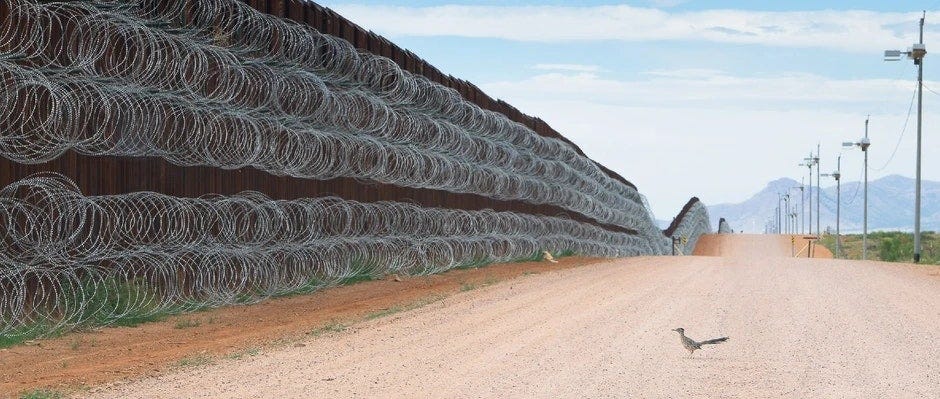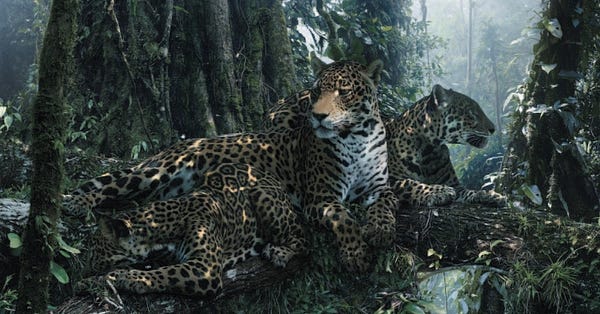🌿Wild Ones #51: Environmental Communication Digest
Environmental Keyword: 'Convivial Conservation' + Celebrating Old Growth + Speaking of Nature + The Wider Influence of Everyday Conversations + more!

Hi everyone, welcome back to Wild Ones, a (not lately but usually) weekly digest by me, Gavin Lamb, about news, ideas, research, and tips in environmental communication. If you’re new, welcome! You can read more about why I started Wild Ones here. Sign up here to get these digests in your inbox:
🌱Environmental Keyword
“Convivial conservation”: From Latin convivere, with etymological roots of ‘con’ (with, together) and ‘vivere’ (to live); the conservation of ‘living with’ or ‘living together.’
I encountered the term in a recent (2020) book with the same name written by political ecologists Bram Büscher and Robert Fletcher, both professors in the Sociology of Development and Change group (SDC) at Wageningen University, The Netherlands.
They created an informative website (with an animated video too) explaining their idea of convivial conservation, along with updates on current research projects on convivial conservation happening around the world, from Finland to Brazil.
They were inspired to call their approach ‘convivial conservation,’ in part after philosopher Ivan Illich’s 1973 book, Tools for Conviviality, and in part after an article published in 2012 in the journal Conservation Letters – Rethinking biodiversity: from goods and services to “living with” – by researchers Esther Turnhout, Claire Waterton, Katja Neves, and Marleen Buizer.
Here’s an excerpt from Büscher and Fletcher’s book that explains a bit more about their use of the environmental keyword ‘convivial conservation’:
“Convivial conservation might sound slightly awkward when suggesting a postcapitalist approach to conservation. Yet we have chosen the term deliberately. Most directly, because it is obvious that we need to find a better way to ‘con vivire’, ‘live with’ (the rest of) nature. At the same time, the term was inspired by Ivan Illich’s 1973 book Tools for Conviviality. In it, he acknowledges that he is ‘aware that in English “convivial” now seeks the company of tipsy jollyness’ but adds that this is ‘opposite to the austere meaning of modern “eutrapelia,” which I intend.’ Eutrapelia is generally defined as ‘the quality of being skilled in conversation’.
We believe that this is precisely what is needed in order to move the Anthropocene conservation debate forward: to skilfully and sensitively engage with the radical ideas now on the table and to imagine and enable a transition to a postcapitalist conservation. This, then, is how we understand and use ‘conviviality’, at least for now.”
– Bram Büscher & Robert Fletcher. The Conservation Revolution (p. 9-10). Verso Books.
Hear Büscher talk more about the ideas in the book in this video.
📚 What I’m reading
Black Surfers Refuse to Be Excluded: ‘I Have a Right to Be on This Wave’ - By Diane Cardwell, Visuals by Joshua Kissi and Morgan Massen. In The New York Times
Abundant Earth: Toward an Ecological Civilization. By Eileen Crist.
Coastal Job: Traditional Ocean Navigator. How Nainoa Thompson learned to read the waves and tap into the magic of the Polynesian wayfinding tradition. As told to Berly McCoy in Hakai Magazine:
“Growing up in Hawai‘i, I had no idea that I was a descendent of the greatest navigators of all time; nothing was taught in school about Hawaiian history or culture. That changed for me in 1974, while I was a paddler for a local canoe club…” – Nainoa Thompson
Thank God for the “Creatures” Beat: Writers reporting on eels, parasites, and other critters in the natural world love what they do — and they hope you do, too. By Jenny G. Zhang in Gawker.
Joe Biden’s Solar Plan and the Prescience of Jimmy Carter. By Bill Mckibben in The New Yorker.
👀What I’m Watching
Celebrating Old Growth: A Conversation w/Robin Wall Kimmerer, Robert Macfarlane, & David Haskell:
“In August 2021, Orion Magazine released Old Growth, an anthology of essays and poems about the lives of trees. It’s a dynamic cross-section of Orion’s long history of engagement with arboreal culture, featuring work by Ursula K Le Guin, Terese Marie Mailhot, Michelle Nijhuis, Michael Pollan, and Arthur Sze…To celebrate the release of the book, Robin Wall Kimmerer (who contributes the foreword) held a public discussion with Robert Macfarlane and David Haskell.”
I’m also watching:
🎧 What I’m listening to
The Ezra Klein Show: In a recent episode of the Ezra Klein show, Ezra does an ‘ask me anything’ segment, answering listener questions on a range of topics, but two topics he mentioned caught my interest in particular: 1) His views on the ‘degrowth’ movement advocated for by scholars like the economic anthropologists Jason Hickel and 2) his views on individual responsibility in promoting social and environmental change.
I’ve mentioned degrowth before here on Wild Ones, so I’ll just mention the second topic Klein talks about, since it brings up some interesting questions for environmental communicators, namely, how important are the everyday conversations we have with other people – whether our friends, family, colleagues, or strangers on the street – in actually influencing wider social and political changes?
In the episode, a listener asks Ezra: “How responsible are individuals for decreasing their personal consumption, and what role should government policy play?”
Ezra Klein: “The way I try to think about this is: don’t think about consumption, even your consumption, as individual. Think of yourself as a node for social, political and moral contagion. I don’t think my personal decision to not eat meat is that important. On the scale of the global animal trade, it’s meaningless. But I caught my veganism from my wife, other people have caught veganism or vegetarianism from me, and it’s in that way that individual attitudes ladder up to social attitudes and then to social and political change.
…So taking seriously the ideas and morals and views of individuals, that’s not a different sphere than what ends up happening in politics. And it’s not just individual. All of the stuff catches. And it is why I’m a fan of people not being quiet about the way they try to instantiate their political ideals in their individual lives. I think that a lot of the value of the choices we make is in our willingness to try to use those to change the choices other people see as normal for them to make.”
Here’s a link to the episode on Spotify below. Ezra’s answer on ‘degrowth,’ and why he thinks it’s “conceptually true” but “politically impossible” starts around the 10:00 mark in the episode. His answer on individual vs. systemic action starts around the 20:00 mark.
🔍 Tools & Resources I’m exploring


Having climate conversations. A handout from 350.org. Also, check out 350.org’s free-to-download climate resistance handbook.
📚 Research
INSECURE: Capturing Intergenerational Narratives of Coastal Change:
“The INSECURE project is using a matrix of participatory research methods to explore how young people engage, examine and understand coastal change within the context of their place within their communities. The project is working with over 60 young people at Withernsea High School [England], which is situated close to the eroding cliffs and thus the school students see the day-to-day effects of their changing coastline.”
Representing nonhuman animals as equals: An ecolinguistic analysis of vegan campaigns. By Alena Zhdanava, Surinderpal Kaur and Kumaran Rajandran in Journal of World Languages.
Climate irresponsibility on social media. A critical approach to “high-carbon visibility discourse.” By Peter Berglez and Ulrika Olausson in Social Semiotics.
📰 News and Events


Join Cristina Mittermeier, Ali Tabrizi, and Carl Safina for a conversation on driftnets, and the road to banning this deadly fishing practice. (recorded past event)
💡 Ideas
Speaking of Nature: Finding language that affirms our kinship with the natural world. By Robin Wall Kimerer in Orion Magazine.
Emotion and Anxiety in Environmental History: October 28, 2021. “Hear from historians as they grapple with the emotional and psychological impacts of environmental change.” Hosted by the Sydney Environment Institute and the Australian and New Zealand Environmental History Network.
un-earthed: an online environmental humanities reading group: “Welcome to un-earthed, an online, monthly reading group dedicated to the environmental humanities, open to academics and non-academics alike.”


💬 Quotes I’m thinking about
“Small acts can make a big difference when there is a background of concern, understanding, and preliminary activism.”
—Noam Chomsky
“There is the scientific and ideological language for what is happening to the weather, but there are hardly any intimate words. Is that surprising? People in mourning tend to use euphemism; likewise the guilty and ashamed. The most melancholy of all the euphemisms: “The new normal.”
“It’s the new normal,” I think, as a beloved pear tree, half-drowned, loses its grip on the earth and falls over.”
– Zadie Smith, Elegy for a Country’s Seasons, in the New York Review of Books.
"The ultimate, hidden truth of the world, is that it is something that we make, and could just as easily make differently."
—David Graeber, in The Utopia of Rules

Thanks so much as always for your interest in my work, and if you found this digest useful, please consider sharing with others who might find it interesting too😊 I'd also love to hear from you. Leave a comment to let me know what you think about this digest, what areas of environmental communication you’re involved in/most interest you, or anything you’d like to see more of in Wild Ones:)




